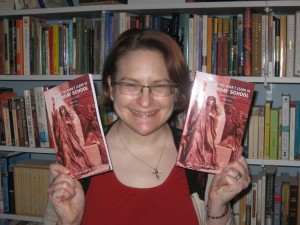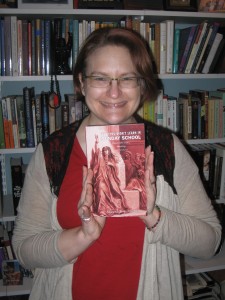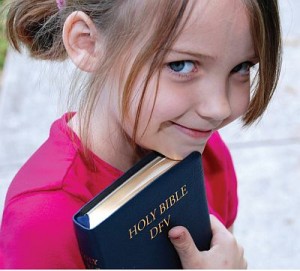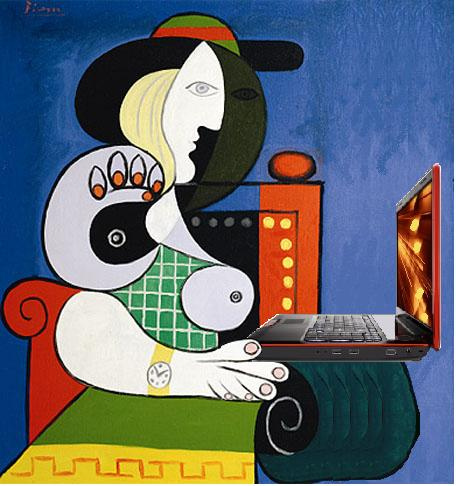This weeks Old Testament reading (Proper 28A/Ordinary 33A/Pentecost +22) is Judges 4:1-7. Unfortunately, the reading stops before the story really gets going and gets good. You really should read the entire chapter, verses 1-24. I wrote this sermon eight or nine years ago, and it is still one of my favorites. Probably because it has some of my favorite people in the Bible.
Everyone Has a Story
Judges 4-5
One of my absolutely favorite news segments was “Everybody Has a Story.” Journalist Steve Hartman had this absolutely cockamamie idea that a person didn’t need to be rich, or famous, or even a celebrity to have a story. He believed that ordinary people, living ordinary lives, in ordinary places had stories that the rest of us would want to hear and might even help us live our own little, ordinary lives. Even Steve admitted he wasn’t sure his idea would work. But for years Steve Hartman proved that everybody has a story. One of things I loved about this news segment is that Steve found some of the most unlikely people, in the most unlikely places, who have lived through and done some of the most unlikely things.
His stories reminded me a lot of the stories I read in the Bible. Ordinary people, doing ordinary things, living ordinary lives. But instead of a pesky reporter dropping in, a pesky God decides to show up and change those ordinary lives forever. That’s what happened in Judges 4.
An Unlikely Couple
The first three verses of this chapter are typical for the book of Judges. In the book of Judges Israel is caught in a very destructive cycle. They decide to worship the gods around them instead of Yahweh–the God who brought them out of Egypt. God then gives them over to an enemy who oppresses them for a while–in this case 20 years. Then the people come to their senses and cry out to God who then raises a judge to deliver them from their oppressors. There is much rejoicing and the people obey God during the life of that judge and then the cycle starts all over again. This is called a downward spiral because not only does the same cycle keep happening, but each time it gets worse.
When we come to verse 4 we read: “At that time Deborah, a prophetess, wife of Lappidoth, was judging Israel.” Now we come to the first twist in this story–the judge is not a man–it’s a woman. We have an unlikely judge–she’s a wife and probably a mother. And why is she the judge and not her husband? Because God called her and not him. Yes, it’s as simple as that. And what about Lappidoth? I always wonder about this man. He’s only mentioned once in the Bible, but he intrigues me. Since Deborah is judging Israel at the palm of Deborah and fulfilling her calling as a prophet, I’m assuming he’s okay with the arrangement. And yes, in our day and age, we go, “Well duh, yes, she can work if she wants to.” Back then, in that day and age, Deborah should have been home being a wife and mother–cooking, cleaning, taking care of the kids. The place she should not have been was out in public, resolving disputes among the people. That was man’s work. That should have been what Lappidoth was doing. But this unlikely couple obeyed God’s rather strange calling on their lives–God called Deborah to be a prophet and judge, and both she and Lappidoth obeyed God’s calling.
So, not only Deborah, but Deborah and Lappidoth are the first unlikely people we meet in this story. Now we will meet our next unlikely person.
An Unlikely General
Barak enters our story next. H’s a general, commander of the army of Israel. Deborah tells him that God has spoken and wants Barak to take an army and move against Israel’s oppressor: Sisera. Up to this point the men God called to judge Israel’s enemies have been gung-ho about going and wreaking a little havoc. God told them to go and destroy Israel’s enemies, and they went and destroyed Israel’s enemies in some very creative ways with no cajoling or prodding. So when Deborah calls Barak and tells him God’s ready to move against Sisera, we expect Barak to yell, “Yippee, it’s about time!” and go. But that’s not what he does. Barak puts a condition on his obedience: Deborah must go with him. The general wants a woman to accompany him in battle. And this woman, this married women who probably had children, says, yes. If that’s what it takes to do God’s will then she will go, so that the enemy can be defeated.
But Barak’s condition costs him: he will not be the one to kill Sisera. In another irony of this story, a woman will kill Sisera. Of course, at this point, we think the woman will be Deborah.
Again Lappidoth impresses me. No, he’s not mentioned in these verses. But his wife is going into war with Barak, and he doesn’t forbid her. In all likelihood, he is probably one of the 10,000 who go into battle. Again this unlikely couple obey God, at what could be great cost to them.
Although Barak wanted assurance of God’s presence, and it did cost him the full glory of the battle, I don’t think we should be too hard on him. Remember Deborah was a prophet–she was God’s representative on earth, speaking the words God gave her. I think if I was Barak, I might want her to come along too; I might want that assurance of God’s presence that Deborah, not only gave to Barak, but gave to the soldiers as well.
So we have an unlikely couple and an unlikely general that God is using to accomplish her plans. Now we are coming to the most unlikely person in the whole story.
An Unlikely Ally
Word reaches Sisera that Barak and his troops are on the move, and Sisera rallies his army to meet them, thinking that he has pretty much won this battle. But God had other plans. Deborah gives the command for the troops to march and Barak leads the way. As they are moving toward each other, God throws Sisera’s army into a panic. I like the account of the battle given in Judges 5:20-21: “The stars fought from heaven, from their courses they fought against Sisera. The torrent Kishon swept them away, the onrushing torrent, the torrent Kishon. March on, my soul, with might!” God once again fought for her people and delivered them from their enemies. In the middle of the fight Sisera sees that things are not going his way, and I’m thinking that what he does isn’t something generals of armies should do: he runs. And this chicken is about to run into a fox.
Back in verse Judges 4:11 we have a verse that appears out of nowhere about a man living in the area. It seems like an odd verse to insert between Deborah’s command to Barak and the preparations to march to war. In this verse we learn about Heber, a man descended from Moses’ father-in-law, who lives in the area. Now in verse 17 we find out why that piece of information appeared out of nowhere. Sisera runs to the place where Heber and his wife, Jael, are staying. At this point in the story it appears that Sisera is home free. There was peace between Heber and King Jabin–Sisera’s boss. For all appearances he should be safe. And Jael plays the perfect hostess…for a while. She invites him in, gives him milk to drink when he asked for water. Then she tucked him in with a rug for a nice nap. But instead of standing guard at the tent as Sisera ordered her, Jael has other plans. Deborah will not be the woman who defeats Sisera–Jael is. And she is a more unlikely person for the job than Deborah. Jael is not only a woman. She is a Gentile woman. She is not from one of the tribes of Israel. God will use this Gentile woman to deliver Israel from their oppressor. Instead of standing guard and deflecting Israel’s soldiers when they come looking for Sisera, Jael sneaks to where he’s sleeping and kills him. Jael is waiting at the entrance to the tent when Barak comes, and she leads him inside the tent, and shows him his enemy, dead. All that Deborah had spoken happened. Israel defeated the army of Sisera, and Sisera had been killed by a woman. After the victory song of chapter 5, we read that Israel had rest for 40 years.
Using a very unlikely combination of people: a wife and mother, a hesitant general, and a Gentile woman, God delivered Israel from their enemies. When God came these people were living their normal, everyday lives. They didn’t think anything was going to change, and they sure didn’t think God would use them to make those changes. But God did.
An Unlikely People
And I’m not sure which should surprise us more: that God uses ordinary people to do His will, or that God gets mixed up with us unpredictable, insecure, hesitant humans at all. Even with Barak’s hesitation and insistence on Deborah coming to battle with him, God still gets mixed up in the lives of these ordinary people, with foibles and quirks, and uses them to accomplish her plans for her people.
I bet Steve Hartman would give his eyeteeth to be able to tell this story on the evening news. You see what Steve doesn’t know is that there is a reason why everyone has a story. It’s because God made everyone. We all have stories because we are made in God’s image. But it gets better than that. God comes to us and wants be a part of our stories. The God who is Creator and Ruler of all wants to take part in our ordinary, mundane, messy lives. Then she wants to use our lives and our stories to build her kingdom and accomplish her plans, not only for the Church, but for the world. But don’t freak out–God doesn’t send us out alone, just like Barak didn’t go out alone. God goes with us, so that everyone we encounter can be a part of her story–just like we are.
So as you live your ordinary life this week, remember all those ordinary people you see have stories. And God wants to be a part of those stories.
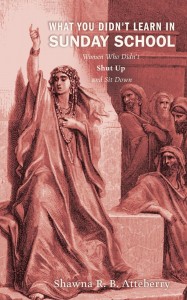 As a theologian and all around Bible geek, I’m sure most of you thought I would be geeking out to The History Channel’s miniseries on The Bible. But I’m not. I’m not even watching it. Sure back in the day when The History Channel actually showed history, I probably would’ve been geeking out. But this is the channel who now airs shows like Ancient Aliens and Swamp Loggers, so I didn’t watch. I have to say after reading what some of my friends thought about it, I’m glad I missed it. Then I read this scathing review by Wil Gafney, Black Samson and White Women on the History Channel, and I’m really glad I’m not wasting my time:
As a theologian and all around Bible geek, I’m sure most of you thought I would be geeking out to The History Channel’s miniseries on The Bible. But I’m not. I’m not even watching it. Sure back in the day when The History Channel actually showed history, I probably would’ve been geeking out. But this is the channel who now airs shows like Ancient Aliens and Swamp Loggers, so I didn’t watch. I have to say after reading what some of my friends thought about it, I’m glad I missed it. Then I read this scathing review by Wil Gafney, Black Samson and White Women on the History Channel, and I’m really glad I’m not wasting my time: